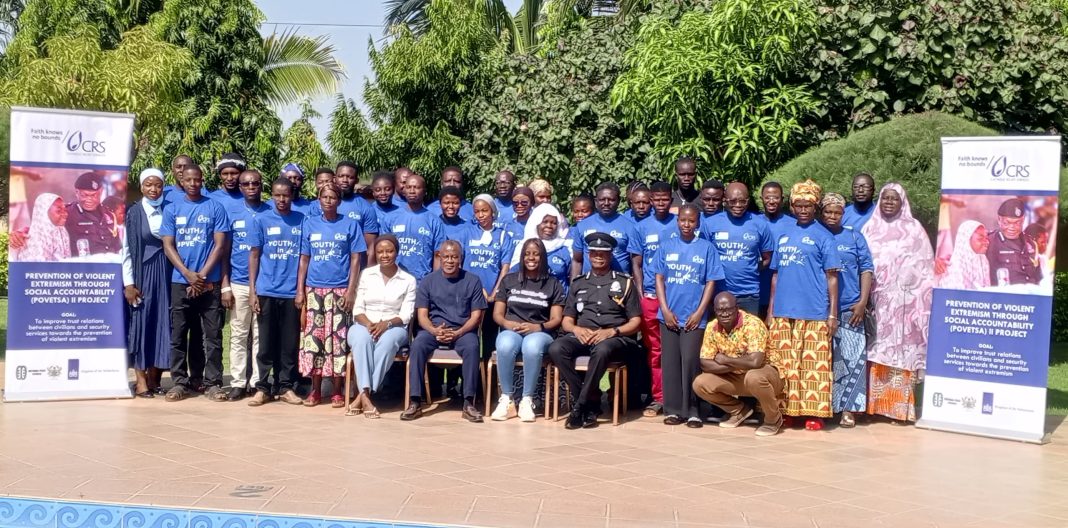Forty carefully selected young people from Bolgatanga and surrounding communities have been trained to become “agents of peace building” equipped with specialized skills to prevent violent extremism from taking root in their communities.
The two-day training is part of the Prevention of Violent Extremism through Social Accountability (PoVETSA) Phase II project implemented by Catholic Relief Services Ghana in partnership with the National Peace Council and the Kofi Annan International Peacekeeping Training Centre.
“Today we are gathered here to bring together 40 carefully selected youth to build their capacities in the areas of prevention of violent extremism, as well as equip them with conflict resolution tools to be used within their respective communities,” said Adelaide Yiriyelleh, project manager for PoVETSA at CRS Ghana.
The training covers tools in mediation, early warning response systems, and dialogue—skills the young participants will take back to their homes, youth groups, and communities across the Bolgatanga Municipality.
“The expectation is that they would be agents of peace building in their respective communities and that any training, any skills acquired here today would be further stepped down in their respective communities, in their respective youth groups, and across their even other communities and family levels as well,” Ms. Yiriyelleh said.
The initiative comes as Ghana works to prevent the spillover of violent extremism from the Sahel region, where neighboring Burkina Faso continues to face attacks, and countries including Benin, Côte d’Ivoire, and Togo have experienced incidents. Ghana’s five northern regions—Upper East, Upper West, North East, Northern, and Savannah—are considered particularly vulnerable due to their proximity to conflict zones and porous borders.
PoVETSA, funded by the Netherlands Ministry of Foreign Affairs, has been operating since October 2022 with a clear mandate: “The main aim of the project is to improve civilian security relations in Ghana towards the prevention of violent extremism,” Ms. Yiriyelleh explained.
The project operates across five regions and addresses root causes of radicalization including youth unemployment—identified as the most common driver of violent extremism in northern Ghana—as well as marginalization, political intolerance, farmer-herder conflicts, and social exclusion.
The Bolgatanga training follows a similar specialized training conducted in Tamale in March 2025, where 40 women were trained in preventing violent extremism and conflict resolution tools. “So this is a follow-up to that training,” Ms. Yiriyelleh said, noting the project’s commitment to building a diverse network of peace champions.
Diversity, she emphasized, is central to the project’s approach. “You can’t talk about inclusion, you can’t talk about social inclusion without bringing together the various voices that matter,” Ms. Yiriyelleh said. “If you are looking at fostering any peace, well, then there’s a need to have that whole of society approach to ensure that every little voice is heard.”
The project specifically targets marginalized groups including women, youth, persons with disabilities, and minority ethnic groups such as the Fulbe and Birifoh communities, recognizing that sustainable peace building requires broad-based participation.
To ensure the training translates into tangible community impact, PoVETSA has established what Ms. Yiriyelleh described as “a very robust monitoring and evaluation system.”
“Right after this training, we have certain indicators that we are going to be measuring on and we are going to conduct, first of all, quarterly monitoring visits,” she said. “We are going to have various field visits to capture success stories, to identify any challenges that may have come up after this training.”
The monitoring system will track participants’ activities and impact against specific indicators, with field visits designed to gather feedback for subsequent interventions and program improvements.
Beyond youth training, PoVETSA’s comprehensive approach includes training 150 security personnel from the Ghana Armed Forces, Police Service, Immigration Service, National Intelligence Bureau, Fire Service, Prisons Service, and NACOC on the “Responsibility to Protect” doctrine and human rights-based conflict management. The project also conducts regional stakeholder dialogues to build trust between civilians and security agencies, implements women’s empowerment programs, and trains journalists on preventing violent extremism.
The initiative operates on a three-level prevention strategy: addressing long-term governance and economic factors (primary prevention), providing real-time crisis relief (secondary prevention), and building post-crisis resilience and stability (tertiary prevention).
For the 40 youth participants gathered in Bolgatanga, the training represents more than skill acquisition—it’s a call to leadership in protecting Ghana’s peace. Armed with tools in mediation, dialogue, and early warning systems, they are expected to serve as the first line of defense against radicalization in their communities.
“Not only would they be fully equipped and their capacities built in the areas of preventing violent extremism and other conflict resolution tools, but they also be agents of peace building within their respective communities, their homes, and then as well as other organizations where they are coming from,” Ms. Yiriyelleh said.
Source: a1radioonline.com|101.1|Mark Kwasi Ahumah Smith|Bolgatanga


